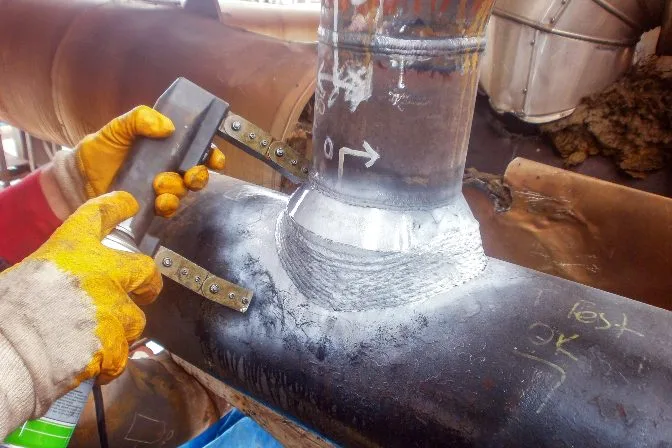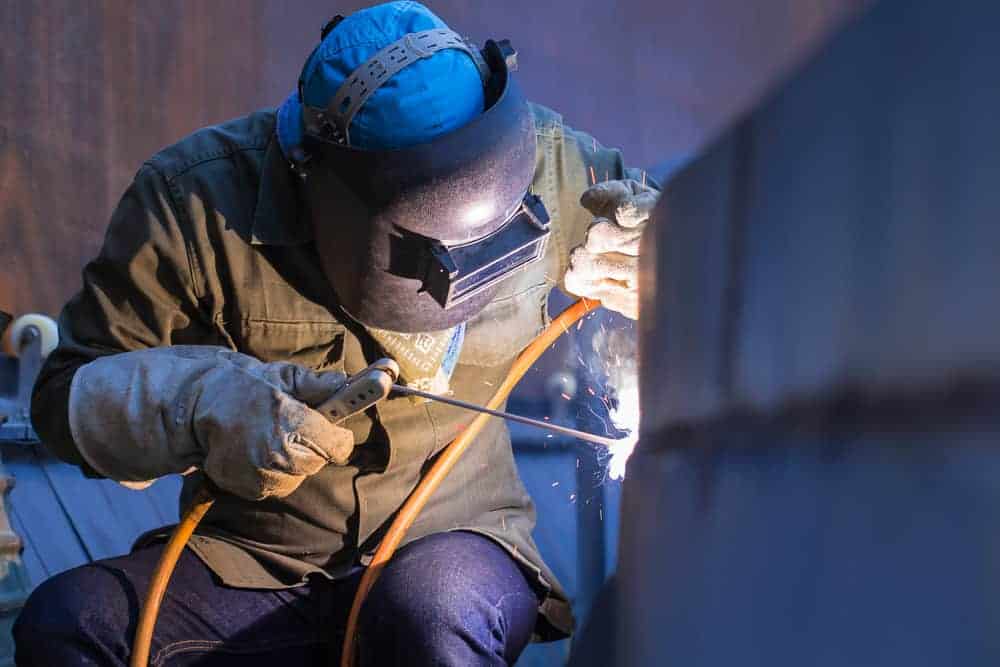The Impact of Rigorous Welding Assessment on Market Standards: Promoting Security, Reliability, and Conformity Across Different Sectors
The role of extensive welding assessment is significantly identified as a crucial part in improving market standards, where compliance, reliability, and safety and security take precedence across varied fields. What makeovers might we anticipate in welding techniques as the need for top quality and safety increases?
Relevance of Welding Assessments
Identifying the critical function of welding inspections in preserving high quality and security standards, sector experts prioritize these assessments to make certain structural honesty. Welding inspections serve as a crucial checkpoint in the fabrication procedure, identifying issues that could jeopardize the toughness and safety of bonded frameworks. By systematically examining welds, assessors can discover concerns such as insufficient penetration, porosity, and splits, which may not be noticeable to the nude eye.
The significance of these examinations extends past simple conformity; they are necessary for securing lives and shielding financial investments. In important sectors such as construction, aerospace, and manufacturing, a single damaged weld can result in devastating failings, leading to both financial loss and human casualties. As a result, applying rigorous examination protocols alleviates these dangers and improves overall job integrity.
Moreover, consistent welding evaluations promote a culture of high quality throughout organizations, encouraging welders to stick to ideal methods and maintain high criteria in their job. This commitment to quality not only enhances operational effectiveness but likewise reinforces the credibility of companies within their corresponding industries. Hence, welding examinations are crucial in promoting security, integrity, and conformity throughout various sectors.
Key Market Specifications and Regulations
The framework of welding assessments is underpinned by a durable set of sector requirements and laws that control methods across different markets. Secret organizations, such as the American Welding Society (AWS) and the International Organization for Standardization (ISO), develop guidelines that ensure quality and safety and security in welding operations. AWS D1.1 lays out crucial needs for welding steel structures, while ISO 3834 defines high quality needs for combination welding.
Along with these details requirements, market guidelines like the American National Criteria Institute (ANSI) and Occupational Safety And Security and Health Management (OSHA) mandates better improve compliance by establishing safety procedures and functional finest techniques. These laws are vital in markets such as construction, manufacturing, and aerospace, where welding honesty is paramount.
Furthermore, sector-specific criteria, such as those from the American Society of Mechanical Engineers (ASME) for stress vessels, supply additional layers of scrutiny to make sure that welds satisfy rigid safety and security and performance criteria. Adherence to these standards not only promotes governing compliance yet additionally cultivates a society of quality and integrity throughout the welding sector, ultimately guarding public well-being and enhancing functional effectiveness.

Advantages of Compliance and Reliability
Continually sticking to sector criteria and guidelines in welding assessments yields considerable advantages, improving total reliability and efficiency. The leading benefit is the assurance of high quality in welded joints, which straight adds to the safety of frameworks and equipment. Compliance with established requirements decreases the danger of failing and tragic occurrences, consequently safeguarding both human life and beneficial possessions.
Moreover, organizations that focus on extensive welding evaluations foster a society of accountability and expertise. This dedication not just boosts the credibility of the business but likewise imparts confidence in clients and stakeholders pertaining to the honesty of services and products. Reliable welding processes cause decreased prices related to rework, repair services, and potential lawful responsibilities originating from Continue subpar craftsmanship.
Furthermore, preserving compliance with sector criteria promotes smoother regulatory communications, as companies can readily show adherence to required procedures (Welding Inspection Gilbert Arizona). This proactive method can lead to helpful partnerships and possibilities within the market, along with access to brand-new markets
Difficulties in Welding Examination
Navigating the complexities of welding assessment provides a myriad of obstacles that can impede compliance with sector requirements. The lack of standardized training for examiners can result in diverse interpretations of assessment criteria, which may endanger safety and integrity.
One more challenge hinges on the availability have a peek at this site of innovative examination tools - Welding Inspection Gilbert Arizona. While modern technologies such as ultrasonic screening and radiography can enhance discovery capacities, their application may be limited by price or availability, especially in smaller sized operations. This disparity can cause a reliance on much less efficient examination approaches, enhancing the threat of undetected flaws
In addition, the hectic nature of modern manufacturing often pressures examiners to prioritize speed over thoroughness, possibly forgeting important problems. Lastly, regulative compliance can be daunting because of the progressing nature of industry criteria, leaving organizations having a hard time to maintain up with the most up to date needs. These difficulties demand continuous improvement in assessment methods to make certain the integrity of bonded frameworks throughout numerous industries.
Future Trends in Welding Practices
Arising innovations and progressing techniques are readied to transform welding practices in the coming years. Improvements in automation, such as robot welding systems, are getting grip, improving precision and effectiveness while lessening human error. These systems will certainly not just accelerate production yet additionally help with constant quality assurance, resolving several of the obstacles encountered in manual welding.
In addition, the combination of man-made knowledge (AI) and artificial intelligence into welding processes is positioned to revolutionize evaluation and surveillance. Real-time information analytics will certainly enable predictive maintenance, permitting for positive treatments that minimize downtime and rise safety. Additionally, boosted fact (AR) and online truth (VR) technologies are coming to be review important in training welders, giving immersive experiences that enhance ability advancement without the threats connected with traditional techniques.
Sustainability is additionally a key pattern, as sectors look for greener techniques. The adoption of green materials and techniques, alongside energy-efficient machinery, will likely come to be conventional. As markets adapt to these adjustments, the emphasis will shift toward higher conformity with safety and environmental policies, making sure that welding techniques not just meet present standards however likewise lead the way for a more secure and even more sustainable future.

Final Thought
In verdict, rigorous welding evaluations substantially improve sector standards by guaranteeing security, dependability, and conformity throughout numerous sectors. By systematically recognizing problems and sticking to developed standards, these examinations mitigate dangers related to architectural failings. The promo of accountability among welders results in better results, fostering count on within communities. As industries continue to focus on functional stability, the value of detailed examinations will just enhance, eventually profiting businesses and culture at huge.
The role of rigorous welding assessment is progressively recognized as an essential part in enhancing sector requirements, where conformity, security, and reliability take priority across diverse fields. Therefore, welding evaluations are indispensable in promoting security, reliability, and compliance throughout numerous sectors.
Key institutions, such as the American Welding Society (AWS) and the International Company for Standardization (ISO), establish standards that make sure quality and security in welding procedures. AWS D1.1 outlines essential requirements for welding steel structures, while ISO 3834 defines quality demands for fusion welding.
In conclusion, rigorous welding assessments significantly improve market criteria by guaranteeing security, reliability, and conformity throughout various industries.